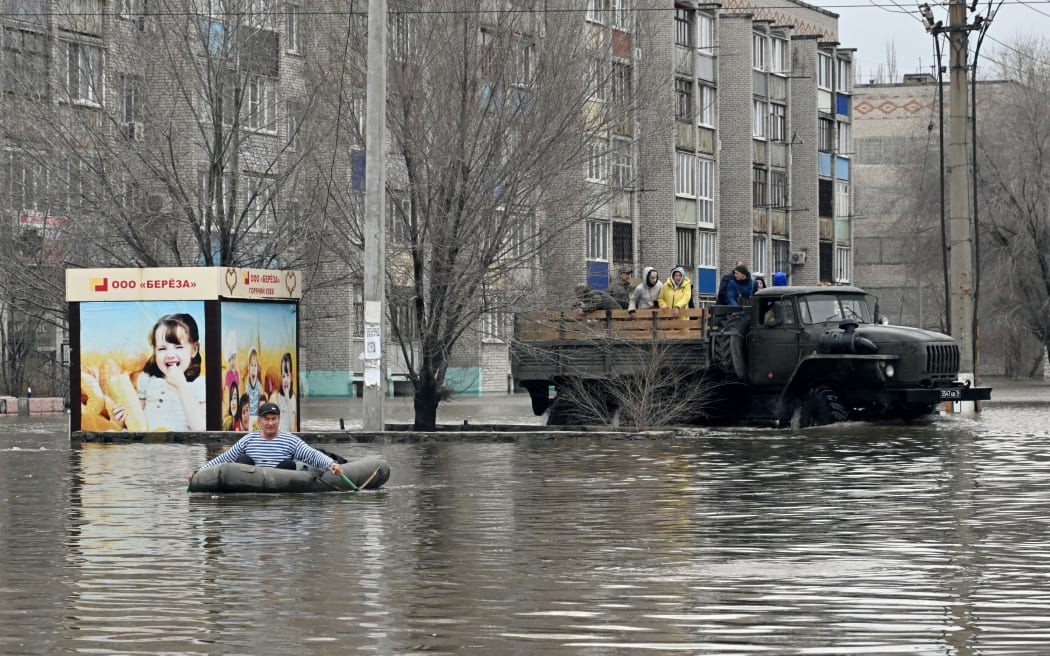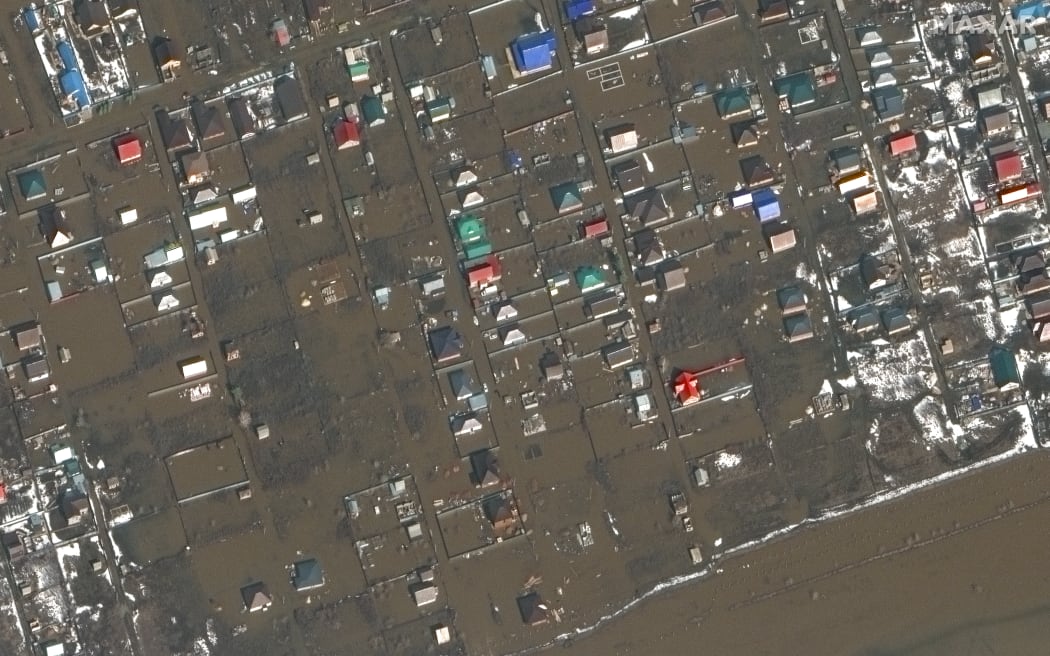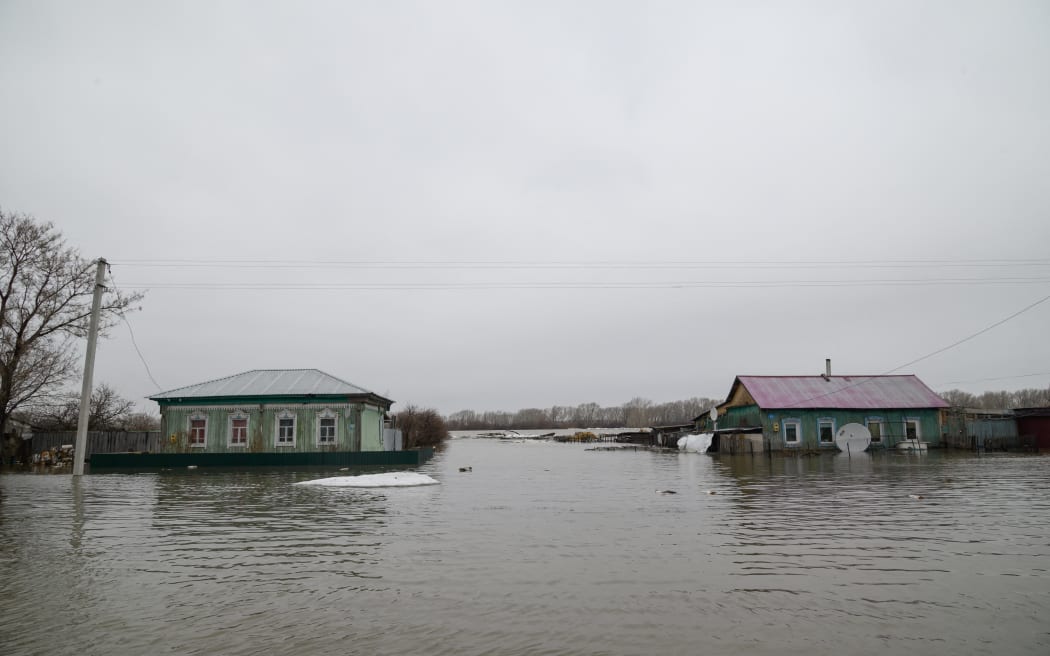
A picture taken on 8 April 2024 shows rescuers evacuating residents from the flooded part of the city of Orsk, Russia's Orenburg region, southeast of the southern tip of the Ural Mountains. Photo: Anatoliy Zhdanov / Kommersant Photo / AFP
Floods have engulfed cities and towns across Russia and Kazakhstan after Europe's third-longest river burst its banks, forcing about 110,000 people to evacuate and swamping parts of the Russian city of Orenburg.
The deluge of meltwater overwhelmed scores of settlements in Russia's Ural Mountains, Siberia, Volga and areas of Kazakhstan after major rivers such as the Ural, which flows into the Caspian, rose more 70 centimetres beyond its bursting point to over 10 metres.
In Orenburg, a city with a population of 550,000 about 1200 kilometres east of Moscow, hundreds of homes were flooded and at least 7700 people were evacuated as the Ural river rose swiftly beyond critical levels.
Whole areas of the city were under water. Residents in Orenburg paddled along roads that now resembled rivers and waters lapped at the windows of traditional wooden houses.
Russian news agencies quoted the Emergencies Ministry as saying 35 tonnes of aid - food, drugs and other necessities - had been flown into the region.
In Kurgan, a region which straddles the Tobol river, 4500 people were evacuated and fears grew that thousands - or even tens of thousands - more would need to evacuated. Sirens in Kurgan warned people to evacuate immediately.
Kurgan region governor Vadim Shumkov, in a statement late on Wednesday (Thursday NZT) quoted by Russian news agencies, said the city of Kurgan was threatened by surges of water caused by reservoirs emptying into the river system.
He said water levels in the city stood at 3.75 metres but could rise sharply as water flowed from the town of Zverinogolovkoye, 100km away, where levels had risen to 9.8m.

This handout satellite image released by Maxar Technologies on April 10, 2024 shows floodwaters around homes near Orenburg airbase on 3 April 2024. Photo: Handout / Satellite image ©2024 Maxar Technologies / AFP
"And the mass of water is going with the current," Shumkov wrote on Telegram. "And flows from reservoirs are not stopping."
If the Tobol rose in the city to 9m, then 17,800 people would have to be evacuated, Shumkov earlier said. If it rose to 14m then the figure would rise to 280,000 people.
"The forecast is unfavourable," Kremlin spokesman Dmitry Peskov told reporters. "The water level continues to rise in flood zones, large amounts of water are coming to new regions."
The flood situation was acute in parts of Western Siberia, the largest hydrocarbon basin in the world, where the peak is expected in three to five days, and some areas around the Volga, Europe's largest river, the emergencies ministry said.
Residents in Orenburg said it was the worst flooding in living memory while Russian officials said it was the worst flooding in the area since records began. Kazakhstan said more than 97,000 people had been evacuated.
Russia said 10,500 houses were flooded across 37 regions, most in the Orenburg region. Upstream on the Ural, which flows into Kazakhstan, floodwaters burst through an embankment dam in the city of Orsk on Friday.

A view of the flooded settlement of Pokrovka, some 90km from the city of Petropavl, in northern Kazakhstan close to the border with Russia on 9 April 2024. Photo: Evgeniy Lukyanov / AFP
Building, strenghtening dams
In Kazakhstan, people worked through the night to build up dykes and strengthen embankments. A state of emergency remained in effect in eight of the country's 17 provinces, down from 10 at the end of last week.
Unverified footage from the Aktobe region of northern Kazakhstan, through which the Ilek, a tributary of the Ural, flows, showed dead cattle, settlements covered in silt and scores of collapsed mud-brick houses.
Pope Francis expressed his sympathy for the victims.
"I also want to convey to the people of Kazakhstan my spiritual closeness at this time, when a massive flood has affected many regions of the country and caused the evacuation of thousands of people from their homes," he said during his weekly audience in St Peter's Square.
Spring flooding is a usual part of life across Russia as the harsh winter snows melt, swelling some of mighty rivers of Russia and Central Asia. This year, though, a combination of factors triggered unusually severe flooding.
Russian emergency officials said the soil was waterlogged before winter and then was frozen under high snow falls which melted very fast in rising spring temperatures and heavy rains.
One Russian official, the Presidential Plenipotentiary in the Urals Region, Vladimir Yakushev, was quoted by Russian media as suggesting that Kazakhstan was to blame for not coordinating the discharge of water more effectively.
Kazakh officials have said much of the water was coming from Russia; there are rivers flowing in both directions between the two countries which share the world's longest land border.
President Vladimir Putin spoke to President Kassym-Jomart Tokayev of Kazakhstan about the floods on Tuesday. The Kremlin said the worst was still to come for the Siberian region of Tyumen and the Urals region of Kurgan.
The Kremlin said Putin was getting updated on the situation but had no immediate plans to visit the flood zone.
- This story was originally published by Reuters.

